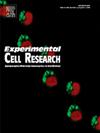Hyaluronic acid-modified extracellular vesicles for targeted doxorubicin delivery in hepatocellular carcinoma
IF 3.3
3区 生物学
Q3 CELL BIOLOGY
引用次数: 0
Abstract
Hepatocellular carcinoma (HCC), a prevalent and deadly cancer, poses a significant challenge with current treatments due to limitations such as poor stability, off-target effects, and severe side effects. Extracellular vesicles (EVs), derived from tumor cells, have the remarkable ability to home back to their cells of origin and can serve as Trojan horses for drug delivery. CD44, a cell surface glycoprotein, promotes cancer stem cell-like properties and is linked to poor prognosis and resistance to chemotherapy in HCC. Therefore, targeting CD44-expressing HCC cells is of interest in the development of novel therapeutic strategies for the treatment of HCC. In this study, we developed tumor cell-derived EVs (TEVs) functionalized with hyaluronic acid (HA) to serve as natural carriers for the precise delivery of doxorubicin (Dox), which specifically targets HCC cells expressing CD44. Our results demonstrated that HA-engineered EVs (HA-EVs) significantly enhanced Dox accumulation within HCC cells. In a mouse model, HA-EVs effectively delivered Dox to tumors, suppressing their growth and progression while minimizing systemic toxicity. This study demonstrates the potential of HA-functionalized EVs as a novel and targeted therapeutic platform for HCC, offering a valuable strategy for improving drug delivery and patient outcomes. This study presents a promising strategy to advance targeted chemotherapy for HCC and address the challenges associated with conventional treatments. Engineered HA-functionalized EVs offer a tailored and efficient approach to increase drug delivery precision, underscoring their potential as a novel therapeutic platform in the realm of HCC treatment.
透明质酸修饰细胞外囊泡用于肝细胞癌中多柔比星的靶向输送
肝细胞癌(HCC)是一种常见的致命癌症,由于稳定性差、脱靶效应和严重副作用等局限性,目前的治疗方法面临巨大挑战。源自肿瘤细胞的胞外囊泡(EVs)具有返回原发细胞的超强能力,可以作为药物输送的特洛伊木马。CD44是一种细胞表面糖蛋白,具有类似癌症干细胞的特性,与HCC的不良预后和化疗耐药性有关。因此,靶向表达 CD44 的 HCC 细胞是开发治疗 HCC 的新型治疗策略的兴趣所在。在这项研究中,我们开发了用透明质酸(HA)功能化的肿瘤细胞衍生EVs(TEVs),作为天然载体精确递送多柔比星(Dox),Dox可特异性靶向表达CD44的HCC细胞。我们的研究结果表明,HA-工程化EVs(HA-EVs)能显著增强多柔比星在HCC细胞内的蓄积。在小鼠模型中,HA-EVs 能有效地将 Dox 送入肿瘤,抑制肿瘤的生长和恶化,同时将全身毒性降至最低。这项研究证明了 HA 功能化 EVs 作为新型 HCC 靶向治疗平台的潜力,为改善给药和患者预后提供了宝贵的策略。这项研究为推进HCC的靶向化疗和应对与传统治疗相关的挑战提供了一种前景广阔的策略。工程化的 HA 功能化 EVs 提供了一种量身定制的高效方法来提高给药的精确性,突出了其在 HCC 治疗领域作为新型治疗平台的潜力。
本文章由计算机程序翻译,如有差异,请以英文原文为准。
求助全文
约1分钟内获得全文
求助全文
来源期刊

Experimental cell research
医学-细胞生物学
CiteScore
7.20
自引率
0.00%
发文量
295
审稿时长
30 days
期刊介绍:
Our scope includes but is not limited to areas such as: Chromosome biology; Chromatin and epigenetics; DNA repair; Gene regulation; Nuclear import-export; RNA processing; Non-coding RNAs; Organelle biology; The cytoskeleton; Intracellular trafficking; Cell-cell and cell-matrix interactions; Cell motility and migration; Cell proliferation; Cellular differentiation; Signal transduction; Programmed cell death.
 求助内容:
求助内容: 应助结果提醒方式:
应助结果提醒方式:


